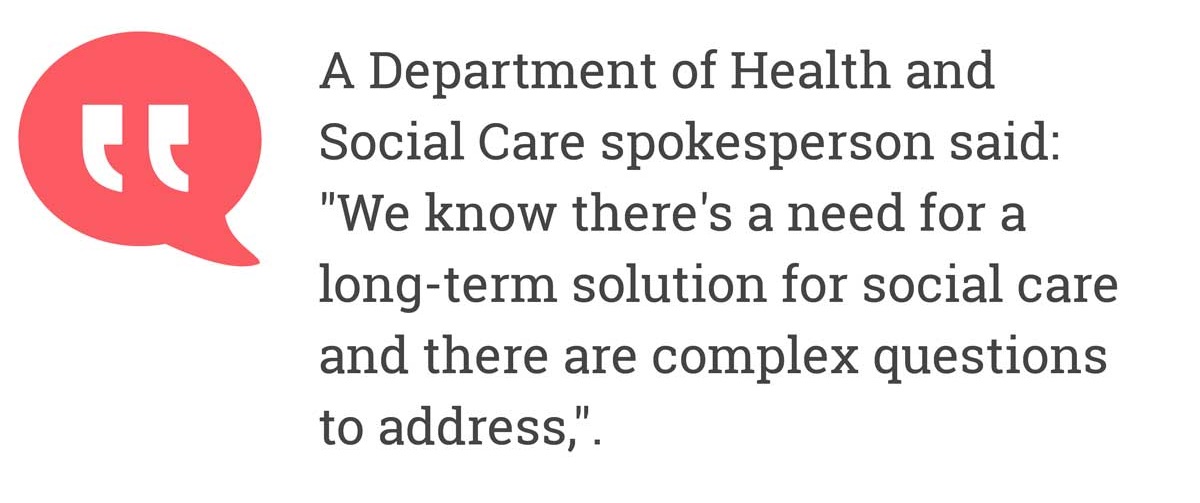- 02 September 2020
- 3 min read
Social Care Reform - Is A One-Year Deadline Realistic?
Subscribe Is a one year deadline realistic for social care reform?
Is a one year deadline realistic for social care reform?Plans to adequately fund the social care sector need to be in place within a year, the head of NHS England has said.
But will this be enough time to sort out an issue of such complexity, or do you think it will mean a compromise that will need to be revisited in the future? Comment 💬 Like ❤️ Reply 🙂 below.
The coronavirus crisis has placed incredible demands on both NHS and care resources.
Sir Simon Stevens, the head of NHS England has said there is a need to "decisively answer" how high-quality care could be provided long-term.
But does the lack of progress by previous governments on this issue mean that any developments this time are likely to be short-term compromises rather than systemic changes?
Previous attempts to reform social care have often ended over disagreements over funding. The government has made an extra £3.2 billion available to help with adult social care during the pandemic.
However, the Association of Directors of Adult Social Services has estimated that adult social care providers face more than £6bn in extra costs because of the coronavirus crisis.
So, how will the government meet both this short-term funding gap and the longer-term structural costs of a fully funded social care sector?
Lots of options have been mooted over the past years; a tax on the over-40s, a rise in national insurance and even the suggestion of a wholesale integration of social care into the NHS system.
This begs the question; Should the NHS and social care sector remain separate but be run along similar lines, or be combined into a single unified system? Also, the fact that there is not overarching agreement on what integrating social care provision into the NHS means in practical terms might suggest it is not the fix-all solution that some people would like it to be.
If the NHS and social care were to fully integrate, should the universal entitlement of NHS care, free at the point of delivery be carried over to social care settings?
Or would a hybrid funding model be needed, where some individual funding was required in addition to state provision?
There is also the risk that any reforms will mirror the requirements of the pandemic under which they were considered, rather than addressing more long-term objective requirements.

How do you think any reform to the social care system should be undertaken?
What will it take for any of the suggested options to come to fruition when all previous attempts were stymied?
Let us know in the comments, and please Like this article if you found it interesting.






About this contributor
Nurses.co.uk Founder
I launched Nurses.co.uk (and subsequently Socialcare.co.uk, Healthjobs.co.uk and Healthcarejobs.ie) in 2008. 500 applications are made every day via our jobs boards, helping to connect hiring organisations recruiting for clinical, medical, care and support roles with specialist jobseekers. Our articles, often created by our own audience, shine a light on the career pathways in healthcare, and give a platform to ideas and opinions around their work and jobs.
More by this contributorWant to get involved in the discussion?
Log In Subscribe to commentDebra Holden
Debra Holden
4 years agoStudies have suggested that the public would prefer a ring-fenced tax deduction to pay for health and social care yet, ... read more
Studies have suggested that the public would prefer a ring-fenced tax deduction to pay for health and social care yet, the public's understanding of social care is insufficient to enable an informed debate with almost 50% believing social care is free like the NHS. Surely this should be the governments priority. Considering this has been in place for decades one has to wonder if the government want the public to be ill informed on this matter.
read less
Interesting last point Debra. Thanks for contributing.
Thank you for sharing this Debra. The stats you share on what the public think are eye-opening.
Zuva Chinhori
Zuva Chinhori
4 years agoHi Matt, Thank you once again for another interesting article. If this 12 month deadline is to simply put “plans” in place ... read more
Hi Matt, Thank you once again for another interesting article. If this 12 month deadline is to simply put “plans” in place it is doable. A big ask but it can be done. My only concern is that people underestimate how much the Coronavirus pandemic slowed things down and by things I mean life in society as a whole and so because of that I think we are likely to see delays. And if it is true that we are going to have another lockdown in Winter then there’s that to contend with as well. I believe whole heartedly the Social Care Sector will one day become a thriving place but for that to take place a long term approach is needed. I welcome these plans to reform but I hope they are not made out of pressure to provide answers quickly or “decisively” as Sir Simon Stevens put it. Otherwise these plans could go awry because we would miss crucial details. Any plans for change need to be built on a premise different to whatever it was before otherwise £3.2bn will go to waste. For me that new premise would put people first and eliminate anything that does not serve people. But why I believe, Social Care will eventually change is because finally the government is ready to at least listen to what the people have been saying for a long time. People in Social Care have long known what the issues were but for any substantial change to take place it had to come from the top because we know that the issues in Social Care a result of a faulty system - a system that was created by the top. The fact that they are ready is great news. In this speech by Matt Hancock https://www.gov.uk/government/speeches/the-future-of-healthcare. Lesson number 1 as he said was “Value Our People” , Number 2 was “Bust Bureaucracy”. These are steps in the right direction. In opinion whether we discussing an integration between the NHS and Social Care or them operating independently - as long as people are not the priority in whichever case - efforts to reform won’t bear much fruit.
read less